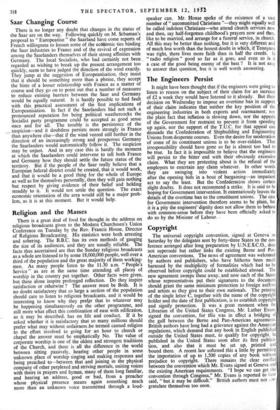Religion and the Masses
There is a great deal of food for thought in the address on religious broadcasts given to the Modern Churchmen's Union Conference on Tuesday by the Rev. Francis House, Director of Religious Broadcasting. His statistics were both arresting and sobering. The B.B.C. has its own methods of gauging the size of its audiences, and they are usually reliable. The facts thus ascertained are that the Sunday religious broadcasts as a whole are listened to by some 18,000,000 people, well over a third of the population and the great majority of them working- men. As many people listen to the 11.30 a.m. " People's Service " as are at the same time attending all places of worship in the country put together. Other facts were given, but these alone inspire prolonged reflection. Do they inspire satisfaction or otherwise ? The answer must be Both. It is no doubt satisfactory that so large a section of the population should care to listen to religious broadcasts, and it would be interesting to know why they prefgr that to whatever may be happening simultaneously on the other programme, and still more what effect this combination of ease with edification, as it may be described, has on life and conduct. If it be asked whether it is satisfactory that so many millions should prefer what may without unfairness .be termed canned religion to the effort involved to going for an hour to church or chapel the answer must be emphatically No. The value of corporate worship is one of the oldest and strongest traditions of the Church, and there is all the difference in the world between sitting passively, hearing other people in some unknown place of worship singing and making responses and being preached to—between that and joining in the physical company of other perplexed and striving mortals, uniting voices with theirs in prayers and hymns, many of them long familiar, and hearing an address, good or bad, from a preacher whose physical presence means again something much more than an unknown voice transmitted through a loud- speaker can. Mr. House spoke of the existence of a vast number of " uncommitted Christians "—they might equally well be called indolent Christians—who attend church services now and then, say half-forgotten childhood's prayers now and then, like to be married, and arrange for a funeral service, in church. All this may be better than nothing, but it is very different and of much less worth than the honest doubt in which, if Tennyson was right, there lives more faith than in half the creeds. Is " radio religion " good so far as it goes, and even so is it a case of the good being enemy of the best ? It is not easy to answer that question, but it is well worth answering.


































 Previous page
Previous page